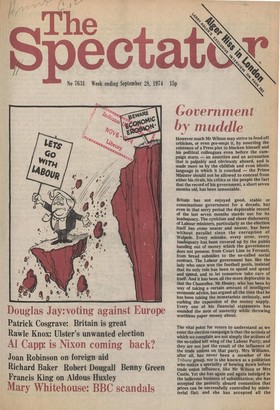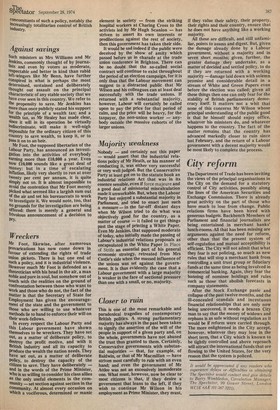Government by muddle
However much Mr Wilson may strive to fend off criticism, or even pre-empt it, by asserting the existence of a Press plot to blacken himself and his political colleagues even before the campaign starts — an assertion and an accusation that is palpably and obviously absurd, and is made more so by the childish and even idiotic language in which it is couched — the Prime Minister should not be allowed to conceal from either his rivals, his critics or the people the fact that the record of his government, a short seven months old, has been lamentable.
Britain has not enjoyed good, stable or conscientious government for a decade, but even in that sorry period the deplorable record of the last seven months stands out for its inadequacy. The cynicism and sheer dishonesty of Labour ministers, particularly as the election itself has come nearer and nearer, has been without parallel since the corruption of Walpole. Every mistake, every error, every inadequacy has been covered up by the public handing out of money which the government does not possess: from Court Line to Ferranti, from bread subsidies to the so-called social contract. The Labour government has, like the lady who once won the football pools, insisted that its only role has been to spend and spend and spend, and to let tomorrow take care of itself. And it has been all the more deplorable in that the Chancellor, Mr Healey, who-has been by way of taking a certain amount of intelligent economic advice, has argued all the time that he has been taking the monetarists seriously, and curbing the expansion of the money supply. Every one of his financial statements has sounded the note of austerity while throwing worthless paper money about.
The vital point for voters to understand as we enter the election campaign is that the action's of which we complain are not simply the actions of the so-called left wing of the Labour Party; and they are not just the result of the influence of the trade unions on that party. Mrs Williams, after all, has never been a member of the Tribune group, nor is she known as a politician who makes a speciality of bowing down before trade union influence, like Mr Wilson or Mrs Castle. Yet she has again and again indulged in the ludicrous business of subsidisation; she has accepted the patently absurd contention that prices can be successfully controlled by ministerial fiat; and she has accepted all the Spectator September 28, 1974 concomitants of such a policy, notably the increasingly totalitarian control of British Industry.



































 Previous page
Previous page